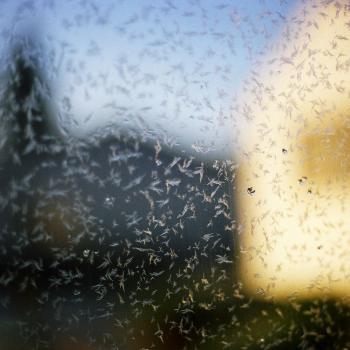 The other day a Facebook friend linked to a blog post on fifteen ways to raise happier, more grateful children. Just that morning I’d been complaining about how ungrateful our kids are for all the comforts they have and all the sacrifices we make for them—all the writing and living my husband and I don’t do so they can have nutritious food and a good education and lots of playtime in the open air. And what thanks do we get?
The other day a Facebook friend linked to a blog post on fifteen ways to raise happier, more grateful children. Just that morning I’d been complaining about how ungrateful our kids are for all the comforts they have and all the sacrifices we make for them—all the writing and living my husband and I don’t do so they can have nutritious food and a good education and lots of playtime in the open air. And what thanks do we get?
Though I know better, I clicked on the link. The blogger approached the whiny, sullen child as a spiritual problem that could be remedied with a combination of crafts and mindfulness exercises. Her advice included passing around a pad of tulip-shaped sticky notes at dinner so your kids can write down what they’re grateful for and then sticking the notes to the window to make a gratitude garden.
My first thought was, if I gave my kids Post-its with instructions to write down what they were grateful for they’d write “butts” on every single page and I’d end up yelling. Then I felt guilty that I haven’t raised kids who would be able to engage in such a wholesome activity without referencing body parts or excrement (which, I assure you, makes them deliriously happy).
Something in me recoiled at the idea of micromanaging my children’s spirituality. I teach them the prayers and traditions of our church and encourage frequent participation in the sacraments. We live the liturgical year. I pray with them and for them. I tell them stories that I hope are preparing them to grow into a life a faith. But I can’t demand that my kids have a religious experience.
My children are immediately suspicious of these kinds of staged projects anyway. It’s like they can smell my desperation, my despair over having reached the bottom of my bag of tricks. It’s as if they know it’s not really me talking but some book or blog I just read. They sense weakness and they go in for the kill.
We should be suspicious too. Everything is a project now—gratitude, happiness, grace, faith—all achievable in a few simple steps, documented with journal entries, status updates, and photographs. There’s nothing we can’t blog our way to, including God.
But when I complained about my kids being ungrateful I hadn’t meant they were ungrateful to God—something I can’t know—I meant they were ungrateful to me. I meant they did not appreciate all the wonderful blessings I bestow upon them all day long, all the sacrifices I make. I wanted them to acknowledge me. I wanted them to appreciate me. I wanted them to validate me: an eight-year-old and four-year-old.
It’s a tale as old as time, I’m sure—I suddenly remembered my own mother giving me the exact same speech and the awful mash-up of guilt and confusion it wrought in me and I thought, oh my, this is not good. Am I looking to them as I look to the Internet—to reassure me that my life is meaningful? That my choices are right? That I’m doing okay? If so, I’m definitely looking in the wrong direction.
Is your child apathetic? Sad? Angry? Disappointed? Welcome to the human experience.
Instead of demanding that these little humans ignore the very conditions that inspire us to cry out in longing for God and replace them with an unfathomable abstraction—gratitude—I might try simply acknowledging that everyone on earth feels the same way half the time or more, and it’s exactly this unending poverty of spirit that is our “only innate treasure,” as Johannes Metz put it, because it is what makes us naturally religious.
Or I might just walk away and ignore their whining.
Because sometimes laundry is just laundry, and dishes are dishes, and kids whine because they’re kids, and the apparent absence of the transcendent in any of it is what drives us to our knees.
But it seems it’s no longer enough to endure or even embrace the endless Sisyphean chores of parenting and life. We Christian parents must enjoy them, and our children must enjoy them, and the key to obtaining this joy—and the measure of our faith—is our gratitude for it all.
We mean well, but our current obsession with gratitude is just another indication that we’ve lost our heads in a race to make the mundane glorious. We aren’t shocked to find God hiding beneath the salt cellar, as the art critic John Berger once put it—we fully expect him there. We’ve already Instagrammed the saltshaker and tagged it blessed.
This no longer strikes me as worshipping a God of small things, the little way of St. Therese or Brother Lawrence, but as making gods of small things, holding up the trivial and the banal and calling it transcendent.
Maybe we only want to share with an audience that God is always there, somewhere, somehow, working all things for good, even when we are alone and afraid, even when all we’ve got going is the work-a-day and the whining child. It is good to be mindful of this—of course it is—but the moment we think we can trace his movements through our days is the moment we deny the mystery of those movements.
“Truth is not something that can be possessed like a tea-cosy,” Caryll Houselander wrote. Or, as her publisher Frank Sheed put it, “Really seeing it includes seeing why we cannot see more of it.”
To be clear, I use social media every day. But it troubles my conscience to imagine how what I hold up as moments of joy or every day “blessings” might be perceived by the friend who is grieving, or lonely, or heartbroken, the friend who is reaching out for God’s hand in the dark and coming up empty, or the friend who is meeting God in despair while I’m claiming to have met him over coffee.
I should be grateful, yes. But beware how quickly an exhibition of gratitude begins to look like self-righteousness, privilege, even naivety.
Maybe this is at the heart of my reluctance to tally my daily blessings and post them—on a window or on my Facebook wall. I know well enough that God’s mercy can be inscrutable and severe. At times I tremble at what I must thank Him for, at what my children might have to call grace.
Jessica Mesman Griffith is a widely published essayist and the author of the memoir Love & Salt: A Spiritual Friendship in Letters, winner of the 2014 Christopher Award. She lives in Northern Michigan with her husband, writer David Griffith, and their two children.
Image Used: Jean Baptiste Greuze, The Punishment Of Filial Ingratitude, oil on canvas, Louvre, 1820












